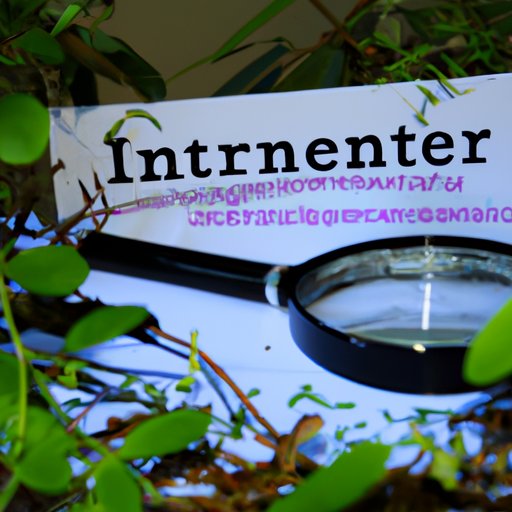Introduction
Inferring is an integral part of scientific research, allowing scientists to draw logical conclusions from evidence and data. But what does infer mean in science? To understand the role of inferring in scientific research and discovery, it’s important to first define the term.
Inferring is defined as “the act or process of deriving logical conclusions from premises known or assumed to be true.” In other words, it’s the process of using existing evidence or data to reach logical conclusions about something. Inferring is used extensively in scientific research, as it allows scientists to draw conclusions about the natural world.

Exploring the Meaning of Infer in Science
Inferring plays a vital role in scientific research and discovery. Scientists use inference to draw conclusions about the world around us, based on observations, experiments, and data. By inferring, scientists can gain insight into the natural world and form hypotheses that can then be tested further.
For example, a scientist may observe that birds migrate south in the winter and infer that they do so because it’s colder in the north. This inference can then be tested further by conducting experiments and collecting data. If the results support the inference, the scientist can then form a hypothesis about why birds migrate south in the winter and use this hypothesis to make predictions about future migrations.
Inferring also plays an important role in scientific discovery. Scientists often use inference to identify patterns in nature that can lead to new discoveries. For instance, when Newton observed an apple falling from a tree, he inferred that the same force was responsible for both the apple’s fall and the moon’s orbit around the Earth. This inference led to his discovery of gravity.
Describing the Process of Inference in Science
Inferring is an essential part of the scientific process. It helps scientists draw logical conclusions from observations and data, which can then be used to form hypotheses and theories. However, inferring is not always easy, as it requires careful analysis of evidence and data to draw accurate conclusions.
To infer accurately, scientists must investigate all available evidence and data and consider all possible explanations. They must also be aware of the limitations of their own knowledge and be open to new interpretations of the evidence. Only then can they draw valid conclusions about the natural world.
In addition, scientists must also be mindful of the impact of their inferences on scientific theory. Inferring can have far-reaching implications for scientific understanding, as it can challenge existing theories or lead to the formation of new ones. As such, scientists must be careful to ensure that their inferences are based on valid evidence and data.
Conclusion
Inferring is an important part of scientific research and discovery, allowing scientists to draw logical conclusions from evidence and data. By inferring, scientists can gain insight into the natural world and form hypotheses that can then be tested further. The process of inferring is complex and requires careful analysis of evidence and data to draw accurate conclusions. In addition, inferences can have far-reaching implications for scientific understanding, as they can challenge existing theories or lead to the formation of new ones.
Overall, inferring plays a vital role in scientific research and discovery, helping scientists gain a better understanding of the natural world. By using inference, scientists can draw valid conclusions about the world around us and form hypotheses that can lead to new discoveries.
(Note: Is this article not meeting your expectations? Do you have knowledge or insights to share? Unlock new opportunities and expand your reach by joining our authors team. Click Registration to join us and share your expertise with our readers.)
